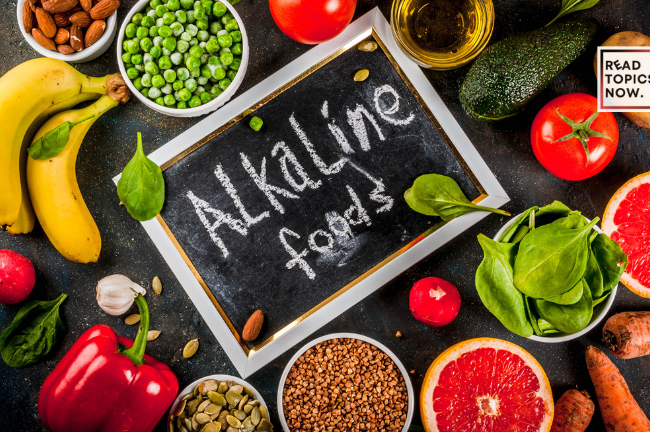
Know What is Alkaline Diet? Myth, Benefits, Recepie

Alkaline Diet Benefits, Myths, Definition
The alkaline diet, also known as the acid-ash diet, focuses on cutting down acidic foods like meat and cheese while promoting alkaline ones like fresh fruits and veggies. Advocates claim it can lower the risk of diseases such as cancer, osteoporosis, and high blood pressure. However, scientific evidence supporting these claims is limited. This blog will tell you about “Alkaline diets and its various health benefits”
The diet aims to balance the body’s pH level, which measures acidity or alkalinity. Acidic substances have pH values below 7, while alkaline ones are above 7. Supporters believe that maintaining a more alkaline pH can prevent various health issues.
Let’s Dive Deep
Eating too many acid-forming foods might cause mild acidosis, linked to diseases like cancer and osteoporosis. By consuming alkaline foods, proponents argue, this risk can be reduced. Yet, there’s not enough proof directly linking food acidity to disease.
While some animal studies suggest cancer cells thrive in acidic environments, human studies are inconclusive. One study found a link between alkaline foods and lower breast cancer risk, but it’s unclear if this is due to the food’s alkalinity or other factors like antioxidants and fiber.
However, it’s challenging to significantly alter body pH through diet since different body parts have different pH levels. For instance, the stomach’s acidic juices aid digestion and protect against diseases.
Benefits of Alkaline Diet
In essence, while the alkaline diet may have its benefits, it’s crucial to recognize its limitations and rely on balanced eating for overall health.
The blood maintains a tightly controlled pH range of 7.35 to 7.45, regulated by the kidneys and lungs. Fluctuations outside this range can be life-threatening. While urine pH can be influenced by diet, healthy kidneys usually keep it in check.
Although the overall body pH isn’t significantly affected by diet, proponents argue that an alkaline diet may ease the burden on organs like the kidneys. However, scientific evidence supporting this claim is limited.
Some Research Based Evidence
Despite some valid reasons to include alkaline foods like fruits and veggies in your diet, there’s insufficient research to advocate for a full alkaline diet for optimal health.
The alkaline diet doesn’t classify foods based on acidity but on their impact on the body, measured by potential renal acid load (PRAL). For instance, citrus fruits, though acidic, are considered alkaline due to their negative PRAL, while protein-rich foods like salmon are discouraged because they’re acid-forming.
The diet emphasizes fruits, veggies, herbs, and spices with negative PRALs to prevent acid buildup. Foods and drinks like water, tea, and some fats are encouraged, while acid-forming ones like animal proteins, nuts, starches, legumes, sweets, and certain beverages should be limited or avoided.

What Alkaline Diet Consist Of
An alkaline diet mainly consists of fruits and vegetables. Here’s a day’s meal plan:
Breakfast: Veggie hash with a banana
Lunch: Kale salad with avocado, blueberries, tomatoes, onion, and lemon olive oil dressing
Snack: Apple with herbal tea
Dinner: Veggie stir fry over cauliflower rice
Several Other Health Benefits of this diet include
1. Improves heart health
By focusing on plant foods, it boosts fiber intake, which lowers LDL cholesterol. Studies show it helps meet heart-healthy nutrient guidelines.
2. Prevents kidney stones
Unlike diets high in animal protein, it makes urine less acidic, reducing kidney stone risk. However, it’s not recommended for everyone.
3. Lacks protein
Excludes animal and limits plant proteins, risking muscle and bone mass loss.
4. Eliminates food group
Cutting out foods without medical need can cause nutrient deficiencies and disordered eating.
Strict alkaline diets may not meet caloric needs, causing physical and emotional issues over time.
The alkaline diet promotes consuming low-acid foods such as fruits and veggies to balance body pH and reduce disease risk. While eating more produce can benefit health, evidence doesn’t strongly connect alkaline foods to better well-being.
It’s unnecessary to follow a strict alkaline diet excluding proteins, dairy, and grains for a healthy, balanced diet.
In a nutshell
Are you curious about the alkaline diet and its potential impact on health? Also known as the acid-alkaline diet or alkaline ash diet, this eating plan revolves around consuming alkaline foods while avoiding acid-forming foods to maintain a balanced pH.
Advocates tout numerous alkaline diet benefits, from reducing the risk of chronic diseases like cancer to promoting cardiovascular health and aiding in weight loss. However, the alkaline diet evidence is a subject of debate, with some praising its focus on whole foods while others criticize its exclusion of processed foods. Proponents suggest that adhering to an alkaline diet can positively influence blood pH and even reduce the likelihood of developing kidney stones.
While the alkaline diet emphasizes the consumption of nutrient-dense fruits and vegetables, it also raises questions about meeting adequate protein sources due to its exclusion of dairy and grains. Critics argue that this restrictive approach may compromise bones and muscles over time. Despite these concerns, research continues to explore the potential benefits of the alkaline diet in supporting overall wellness optimization. Understanding the intricate relationship between pH levels, disease prevention, and dietary choices remains crucial for those intrigued by the alkaline diet’s promises of a healthier lifestyle.
Frequently Asked Questions
- What foods are alkaline-forming in the alkaline diet?
The alkaline diet focuses on foods that leave an alkaline ash after the body digests them. Here are some examples of alkaline-forming foods:
Fruits: Most fruits, except for some very acidic ones like cranberries and plums.
Vegetables: Especially leafy green vegetables and vegetables with low starch content, like broccoli, asparagus, and cucumbers.
Legumes: Lentils, beans, peas, and soybeans.
Nuts and seeds: Almonds, chestnuts, pumpkin seeds, and flaxseeds.
Soy products: Tofu and tempeh.
- What are the top 10 Alkaline Foods available?
While there isn’t a universally agreed-upon ranking, here are 10 popular alkaline foods:
- Leafy greens (kale, spinach, collard greens)
- Broccoli
- Asparagus
- Cucumbers
- Avocados
- Lemons (despite their acidic taste, they leave an alkaline residue)
- Tomatoes
- Bell peppers
- Melons
- Almonds
- Can you quickly alkalize your body?
There’s no scientific evidence that you can rapidly “alkalize” your body. Your body has mechanisms in place to regulate its pH within a healthy range regardless of what you eat. Focusing on a balanced diet rich in fruits, vegetables, and whole grains is a better approach for overall health.
Related Posts
Get Curated Post Updates!
Sign up for my newsletter to see new photos, tips, and blog posts.

I blend engineering prowess with MBA insights, embracing life with perspective and imagination. My mantra? ‘Get busy living or get busy dying.’ Fascinated by tech, geopolitics, AI, sports, cinema, and jazz.





